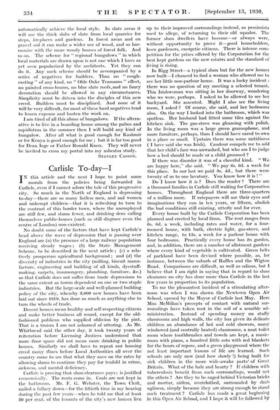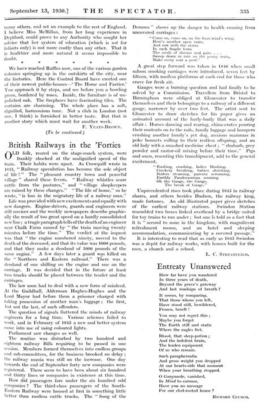Carlisle To-day—I
IN this article and the next I hope to point some -I- morals from the policies being forwarded in Carlisle, even if I cannot adorn the tale of this progressive city. So much in the North of England is depressing to-day—there are so many listless men, and sad women and unkempt children—that it is refreshing to turn to the contrast of this border town, where the unemployed are still few, and slums fewer, and drinking dens calling themselves public-houses (such as still disgrace even the centre of London) non-existent. No doubt some of the factors that have kept Carlisle's head above the wave of depression that is passing over England are (a) the presence of a large railway population receiving steady wages ; (b) the State Management Scheme, to be described in the next article; (c) a rela- tively prosperous agricultural background ; and (d) the diversity of industries in the city (milling, biscuit manu- facture, engineering and building of all kinds, dyestuff- making, carpets, ironmongery, plumbing, furniture, &c.) so that Carlisle does not suffer from trade depressions to the same extent as towns dependent on one or two staple industries. But the large-scale and well-planned building policy of the city, whereby 8,000 new houses have been laid out since 1919, has done as much as anything else to turn the wheels of trade. Decent houses mean healthy and self-respecting citizens and make better business all round, except for the old- fashioned publican who supplied oblivion by the pint. That is a truism I am not ashamed of uttering. As Mr. Whitbread said the other day, it took twenty years of reiteration before Licensing Justices understood that more floor space did not mean more drinking in public houses. Similarly we shall have to repeat our housing creed many times before Local Authorities all over the country come to see that what they save on the rates by allowing slums to continue they pay for tenfold in crime, sickness, and mental deficiency. Carlisle is proving that slum clearance pays ; is justified economically. The rents come in. Coals are not kept in the bathroom. Mr. F. G. Webster, the Town Clerk, nailed a fallacy down—for the fiftieth time in my hearing during the past few years—when he told me that at least 90 per cent. of the tenants of the city's new houses live up to their improved surroundings instead, as pessimists used to allege, of returning to their old squalor. The former slum dwellers have become—or always were, without opportunity to prove it—good householders, keen gardeners, energetic citizens. There is intense com- petition for the prizes offered by the Corporation for the best kept gardens on the new estates and the standard of living is rising. In Rigg Street—a typical slum but for the new houses now built—I chanced to find a woman who allowed me to see her little non-parlour house. It was a lucky incident ; there was no question of my meeting a selected tenant. This Irishwoman was sitting in her doorway, wondering who we were, perhaps. I asked to be allowed to see her backyard. She assented. Might I also see the living room, I asked ? Of course, she said, and her bedrooms also. On the way I looked into the bathroom, which was spotless. Her husband had fitted some tiles against the kitchen sink. The gas-stove was gleaming with polish. In the living room was a large green gramophone, and more furniture, perhaps, than I should have cared to own in a place so small. Upstairs there was some untidiness ( I have said she was Irish). Candour compels me to add that her child's face was unwashed, but who am I to judge how a bed should be made or a child groomed ?
If there was disorder it was of a cheerful kind. " We are happy here," she said. " We pay 6s. 6d. a week for this place. In our last we paid 3s. 4d., but there were twenty of us to one lavatory. You know how it is "
Do I know how it is ? Does the reader ? There are a thousand families in Carlisle still waiting for Corporation houses. Throughout England there are three-quarters of a million more. If ratepayers will use their eyes and imaginations they can in ten years, or fifteen, abolish the bad conditions still existing, utterly and for ever. Every house built by the Carlisle Corporation has been planned and erected by local firms. The rent ranges from 6s. 6d. a week, including rates and water, for a four- roomed house, with bath, electric light, gas-stove, and kitchen range, to 15s. a week for a parlour house with four bedrooms. Practically every house has its garden, and, in addition, there are a number of allotment gardens where every kind of vegetable is cultivated. Green belts of parkland have been devised where possible, as, for instance, between the suburb of Raffles and the Wigton Road. Comparisons are difficult, as well as odious, but I believe that I am right in saying that in regard to slum clearance no city has done more than Carlisle in the last few years in proportion to its population. To me the pleasantest incident of a stimulating after- noon was when I was shown the Newtown Open Air School, opened by the Mayor of Carlisle last May. Here Miss McMillan's precepts of contact with natural sur- roundings have taken root in the soil of a sensible ad- ministration. Instead of spending money on stuffy classrooms and high walls, the city has given its delicate children an abundance of hot and cold showers, many windowed (and centrally heated) classrooms, a neat toilet room where toothbrushes and towels are kept, a music- room with piano, a hundred little cots with red blankets for the hours of repose, and a green playground where the not least important lessons of life are learned. Such schools are only now (and how slowly !) being built for sick children in the more wide-awake parts' of Great Britain. What of the hale and hearty ? If children with tuberculosis benefit from such surroundings, would not the others ? Are they to be caged behind Victorian bricks and mortar, airless, overclothed, surrounded by drab ugliness, simply because they are strong enough to stand such treatment ? Carlisle has made a great beginning in this Open Air School, and I hope it will be followed by many others, and set an example to the rest of England. I believe Miss McMillan, from her long experience in. Deptford, could prove to any Authority who sought her advice that her system of education (which is not for infants only) is not more costly than any other. That it is healthier and more natural it seems impossible to doubt.
We have reached Raffles now, one of the various garden colonies springing up in the outskirts of the city, near the factories. Here the Control Board have erected one of their newest public-houses—' The Horse and Farrier.' You approach it by steps, and see before you a bowling green, bordered by roses. Inside, the furniture is of un- polished oak. The fireplaces have fascinating tiles. The curtains are charming. The whole place has a soft, dignified, harmonious tone. Not a club in London (not one, I think) is furnished in better taste. But that is another story which must wait for another week. F. YEATS-BROWN. (To be continued.)











































 Previous page
Previous page